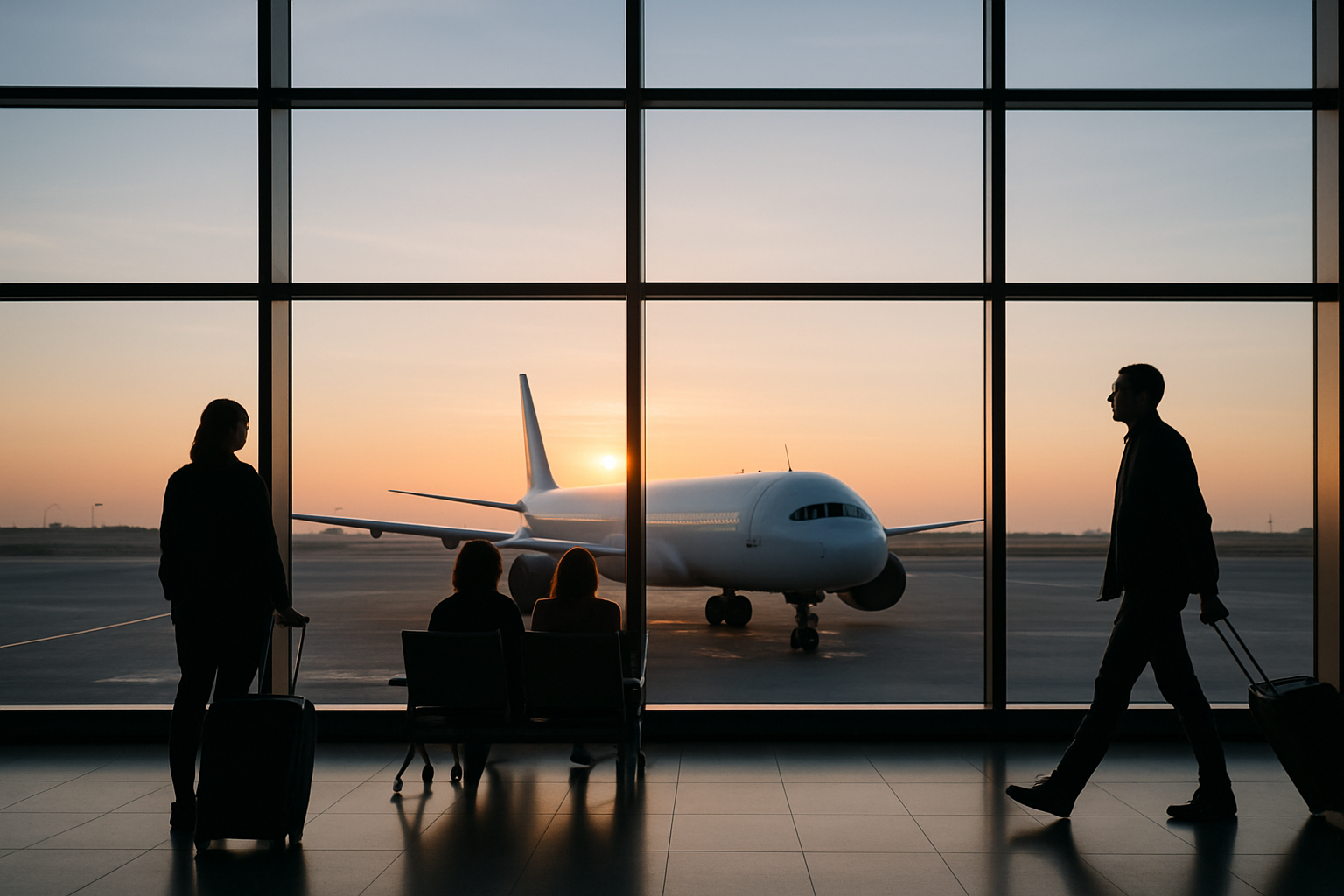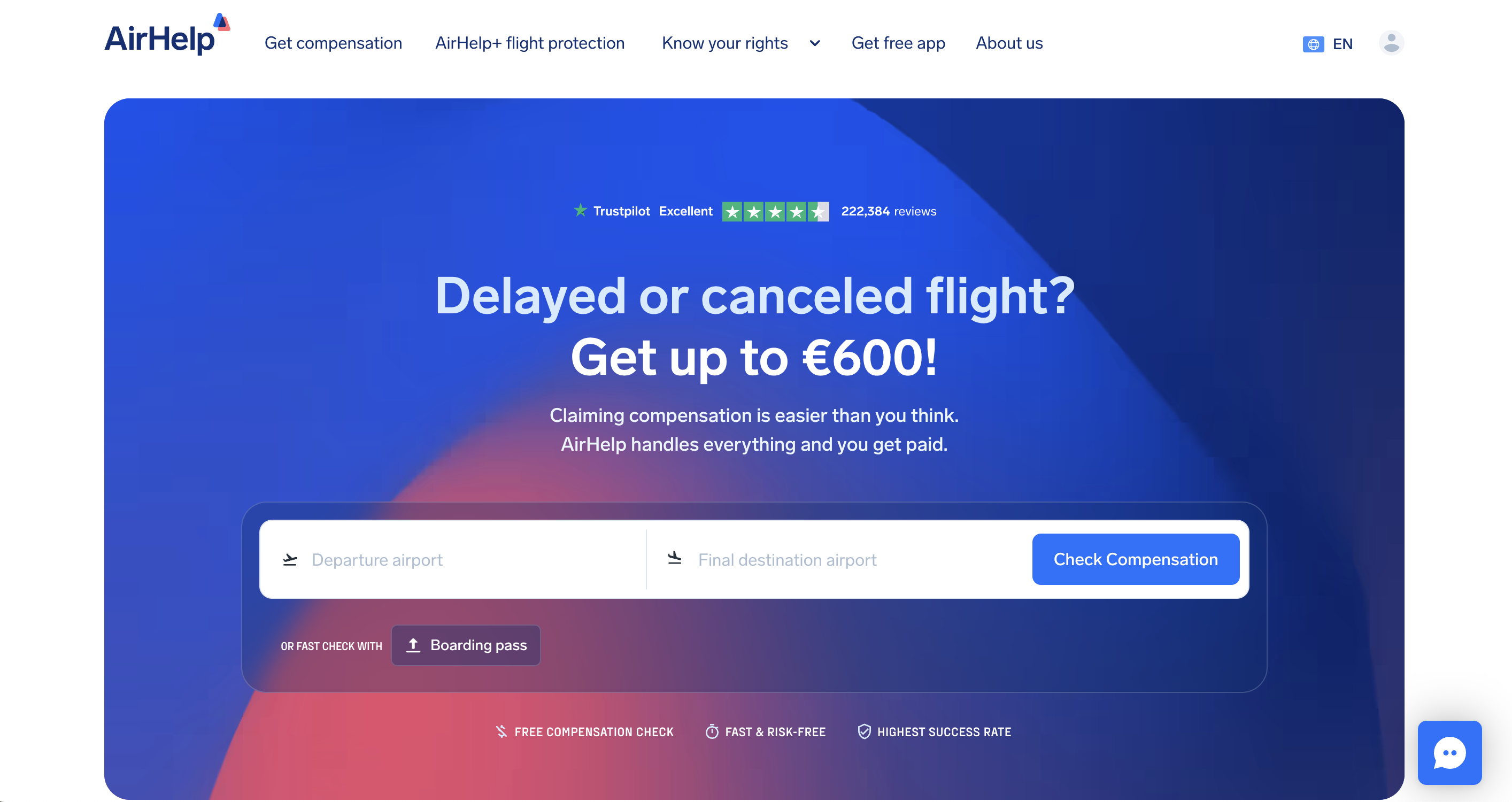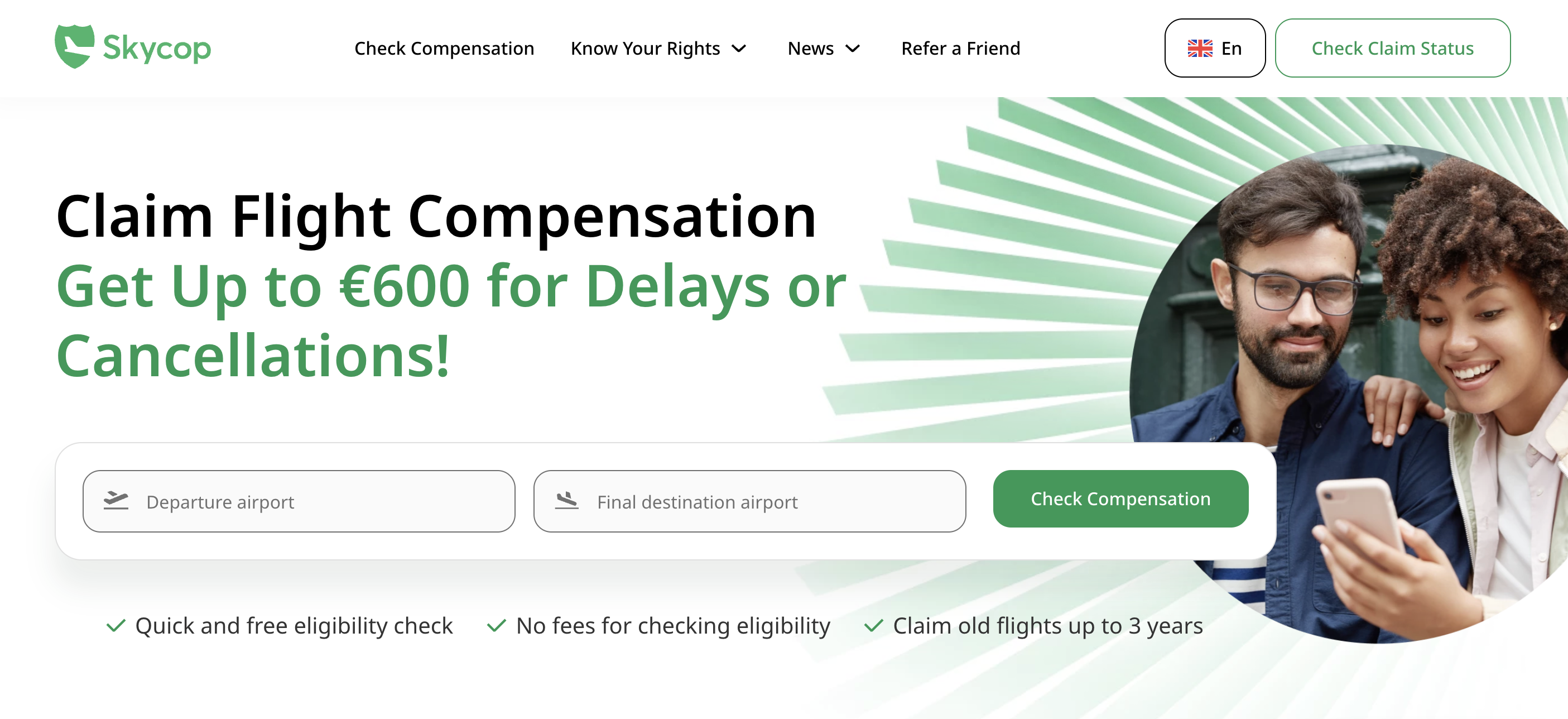Best Airhelp Services in 2025: Compare Flight Compensation Platforms, AI-Powered Claims, and Traveler Support September, 2025
Airhelp services make it easier for travelers to claim compensation for delayed or cancelled flights under EU261 and similar laws. Our guide reviews the best platforms in 2025, comparing coverage, fees, speed, and AI-powered tools.
 Written by Nikolas Sargeant
Written by Nikolas Sargeant
Airhelp services are specialized platforms that help air passengers claim compensation when their flights are delayed, cancelled, or overbooked. Most travelers don’t pursue these claims because the process can be complex, time-consuming, and often stacked in the airline’s favor. Airhelp services simplify it by handling the entire process on behalf of the passenger.

At their core, these services operate under regulations like EU261/2004, which entitles passengers to up to €600 in compensation depending on flight distance and delay length. Similar protections exist in other regions, such as Canada’s Air Passenger Protection Regulations (APPR) or Brazil’s ANAC rules, but Europe remains the most mature and well-enforced market.
Here’s how they generally work:
- Passenger submits flight details — flight number, date, booking reference.
- Eligibility check — the service uses legal databases and increasingly AI-powered tools to confirm whether the case is valid.
- Claim filing — the company contacts the airline on the passenger’s behalf.
- Negotiation and enforcement — if the airline resists, the service may escalate to legal action.
- Payout — once compensation is awarded, the service takes a cut (usually 20–35%) and transfers the rest to the passenger.
Well-known providers like AirHelp, Flightright, ClaimCompass, Compensair, and Skycop have handled millions of claims, recovering billions of euros in total.
For passengers, the value is clear: no upfront cost, minimal effort, and a much higher chance of success compared to going it alone.
How Airhelp Services Work
While each platform has its own interface and pricing model, the process is broadly similar across the industry. What separates providers is how efficiently they handle each stage, and how much of the payout they let you keep.
1. Submitting a Claim
The process usually begins on the provider’s website or app. Passengers enter:
- Flight number
- Date of travel
- Booking reference or ticket details
Some platforms allow you to upload a boarding pass or email confirmation for quicker verification.
2. Eligibility Check
The service checks whether the disruption qualifies for compensation.
- EU261/2004: applies to flights departing from or arriving in the EU on an EU carrier.
- Other regulations: some providers also handle claims under Canadian, Brazilian, or Turkish passenger rights laws.
This is where AI-powered claim checkers have become common. They instantly cross-reference flight data, weather records, and legal precedents to predict whether your claim will succeed.

3. Filing the Claim
If eligible, the company submits the claim directly to the airline. Many carriers initially deny or delay claims, so automation helps in sending follow-ups and keeping pressure on.
4. Negotiation and Escalation
- If the airline cooperates, the claim is settled quickly.
- If the airline refuses, the service may escalate to national enforcement bodies or partner law firms.
- Some services are more aggressive than others in pursuing legal action.
5. Payout
Once compensation is secured:
- The provider deducts its fee (commonly 20–35%).
- The balance is transferred to the passenger via bank transfer, PayPal, or sometimes crypto.
Key Difference:
Some platforms are no-win, no-fee, they only get paid if you do. Others charge an upfront service fee (less common). Always check before submitting a claim.
Key Features to Look For
Not all Airhelp services are created equal. The core process is similar across providers, but the details, fees, coverage, speed, and support, make a real difference. Here are the features that matter most when choosing a service.
1. Coverage Scope
- Geography: Some platforms only handle EU261 claims, while others extend to Canada, Brazil, Turkey, and beyond.
- Airlines: Larger services have stronger track records against major carriers, while smaller ones may focus on regional routes.
2. Types of Disruption Covered
- Flight delays (usually 3+ hours under EU261)
- Cancellations
- Denied boarding / overbooking
- Missed connections
- In rare cases, baggage issues (though most focus only on flight disruptions)
3. Payout Speed
- Fast-track crypto or PayPal payouts are now offered by some providers.
- Traditional bank transfers can take several days to weeks.
- Legal cases can extend the timeline to months if an airline resists.

4. Fees and Transparency
- Standard success fees range from 20%–35% of the compensation.
- Some providers also charge additional legal action fees if the case goes to court.
- Always check whether the quoted fee includes VAT and admin charges.
5. AI-Powered Eligibility Tools
- Modern platforms use AI to scan flight databases, weather conditions, and legal precedents.
- This reduces false claims and saves time, though automation can sometimes reject borderline cases prematurely.
6. Customer Support
- Multilingual support is essential for international travelers.
- Availability varies: some offer 24/7 live chat, others only email.
- Responsiveness often makes or breaks the customer experience.
7. Mobile vs. Desktop Experience
- Many providers now have mobile apps for quick claim submission.
- Others remain desktop-first, which can be inconvenient when traveling.
Top Airhelp Services in 2025
The market for flight compensation platforms has matured over the past decade. A handful of providers dominate, each with different strengths. Below is a breakdown of the leading services in 2025, including their pros, cons, and key differentiators.
1. AirHelp
Overview: The best-known name in the industry, operating globally with millions of claims processed. Strong brand recognition and a polished mobile app. AirHelp is often the first platform passengers encounter, thanks to aggressive digital marketing and partnerships with airlines and travel agencies. Its scale gives it access to a vast database of past cases, which improves its AI-powered eligibility checks and prediction models.
-
Strengths:
-
Global coverage, including EU, Brazil, Turkey, and select other jurisdictions
-
User-friendly app with flight disruption alerts
-
Large legal network for escalation
-
Weaknesses:
-
High fees (up to 35% including legal costs)
-
Mixed reviews on payout speed in complex cases
Best for: Casual travelers who want the simplest, most recognizable option.

2. Flightright
Overview: A German-based service with deep expertise in EU261 claims. Strong legal background and track record against European carriers. Flightright is considered one of the pioneers of the sector, with over a decade of experience fighting airlines in court. Its database of judgments has become a key resource, giving it higher win rates than many competitors.
-
Strengths:
-
Very high success rate in EU courts
-
Transparent fee structure
-
Strong reputation for accuracy
-
Weaknesses:
-
Limited outside EU coverage
-
No dedicated mobile app
Best for: European travelers prioritizing reliability and legal strength.
3. Compensair
Overview: A growing platform focused on EU and CIS countries. Expanding coverage and partnerships with travel agencies. Compensair has gained traction in Eastern Europe and Russia, where bigger Western players have limited presence. Its multilingual platform and regional focus make it an attractive alternative for travelers outside Western Europe.
-
Strengths:
-
Broad coverage in Eastern Europe and CIS markets
-
Competitive fees (~25%)
-
Multilingual support, including Russian
-
Weaknesses:
-
Slower payout times compared to bigger players
-
Less brand recognition globally
Best for: Travelers flying frequently in Eastern Europe, Russia, or CIS routes.

4. ClaimCompass
Overview: A smaller but well-rated service with a straightforward interface and fair pricing. ClaimCompass markets itself as the “transparent” alternative in a space sometimes criticized for hidden fees. Its clean design and quick online eligibility checker make it appealing to younger, tech-savvy travelers who want to avoid long forms. Though smaller than its rivals, its reputation for fairness has built a loyal user base.
-
Strengths:
-
Competitive fees (~20–25%)
-
Simple, transparent website and process
-
Good customer support reputation
-
Weaknesses:
-
Limited legal escalation capacity compared to larger firms
-
Narrower airline coverage
Best for: Travelers who value low fees and transparency.
5. Skycop
Overview: A heavily marketed provider known for speed and aggressive pursuit of claims. Skycop invests heavily in advertising, making it one of the most visible services in Europe. The platform appeals to users who want quick results and are less concerned about paying higher fees for faster payouts. It has successfully positioned itself as a challenger brand against AirHelp’s dominance.
-
Strengths:
-
Strong marketing presence, easy to use
-
Fast initial payouts in straightforward cases
-
Broad airline coverage
-
Weaknesses:
-
Mixed reviews on transparency of fees
-
Pushy marketing may turn off some users
Best for: Travelers who want quick processing and don’t mind higher fees.
6. FairPlane
Overview: A law-firm-backed platform with strong legal credibility. Known for winning tough cases. FairPlane’s legal-first approach means it is often slower than competitors, but far more thorough when airlines resist. Business travelers and frequent flyers with large claims often prefer FairPlane because of its reputation for persistence and legal rigor.
-
Strengths:
-
Legal-first approach, strong expertise
-
Proven track record in difficult claims
-
High trust among business travelers
-
Weaknesses:
-
Slower payouts (court cases take longer)
-
No mobile-first tools
Best for: Passengers with complex cases or who value legal expertise over speed.

Honorable Mentions
- RefundMe: Germany-based, good but overshadowed by Flightright. Works well for straightforward EU claims.
- EUclaim: Longstanding Dutch provider with niche strength in the Netherlands and UK. Good local expertise but limited brand recognition.
- Flight-Claim.eu: A smaller but growing option in the EU market, often recommended for budget-conscious travelers.
The Role of AI in Airhelp Services
Artificial intelligence is reshaping how Airhelp platforms process claims. What used to take weeks of manual checking can now be handled in seconds, improving efficiency for both providers and passengers. At the same time, automation introduces new risks, false rejections, lack of transparency, and over-reliance on algorithms.
1. Faster Eligibility Checks
Traditionally, eligibility was determined by cross-referencing flight records, weather reports, and passenger rights laws. This could take hours of manual effort.
- AI claim checkers now automate this process by instantly pulling flight data from global databases and comparing it to legal thresholds.
- Platforms like AirHelp and Flightright use machine learning models trained on thousands of past cases, which helps predict success rates before pursuing a claim.
Benefit: Faster screening reduces wasted time on invalid claims, meaning passengers get answers almost instantly.
2. Predictive Success Models
AI doesn’t just check if a claim is valid, it estimates the likelihood of success.
- By analyzing historical case outcomes, AI can predict whether an airline is likely to settle or push back.
- This helps providers decide when to escalate legally and when to drop borderline cases.
Benefit: Resources are focused on claims most likely to win, improving efficiency.
Risk: Some valid claims may be rejected prematurely if algorithms favor “safe bets.”
3. Fraud Detection
Airlines are quick to accuse claimants of fraud, especially in high-volume cases.
- AI helps flag suspicious patterns, such as duplicate claims, false documents, or mismatched travel details.
- This protects both providers and passengers from wasted legal battles.

4. Automated Customer Support
Many platforms now deploy AI chatbots to handle common customer queries:
- Claim status updates
- Required documents
- Expected payout timelines
This reduces workload for human agents and speeds up responses. However, travelers with complex issues often find chatbots unhelpful, so the best services balance automation with live support.
5. Case Study: AirHelp
AirHelp has invested heavily in AI. Its AirHelp Score combines flight data with machine learning to estimate the odds of claim success. This has streamlined millions of cases and allowed the company to operate at scale. While effective, critics argue that AirHelp’s algorithms sometimes prioritize volume over individual fairness.
6. Risks and Trade-Offs
- False negatives: AI may reject borderline claims that a human lawyer could win.
- Opacity: Algorithms are rarely explained, leaving passengers in the dark.
- Over-automation: Customer frustration grows when bots can’t handle nuanced cases.
Market Impact and Traveler Benefits
The rise of Airhelp services has shifted the balance of power between airlines and passengers. For decades, compensation rights existed on paper but were rarely enforced in practice. By automating claims and scaling enforcement, these platforms have forced airlines to pay out billions in compensation that would otherwise have gone unclaimed.

1. Leveling the Playing Field
Airlines often rely on passengers giving up. Long forms, vague responses, and delayed replies discourage most travelers from pursuing claims. Airhelp services have removed that friction.
- Impact on airlines: More payouts, more pressure to comply with EU261 and similar laws.
- Impact on passengers: Easier access to compensation that was technically always theirs.
This democratization of claims has increased public awareness of passenger rights, making airlines less likely to brush off complaints.
2. Market Growth
The global flight compensation market has expanded rapidly since the mid-2010s.
- Providers like AirHelp alone have processed millions of cases worth billions of euros.
- Smaller platforms are now emerging in Latin America, Canada, and Asia as passenger protection laws evolve.
This growth reflects not just higher air traffic, but also the effectiveness of digital-first enforcement.
3. Benefits to Travelers
Passengers now enjoy several concrete advantages:
- Access without expertise: No need to know EU261 legal details.
- Time saved: A process that once took months now starts with a few clicks.
- Higher success rates: Platforms escalate aggressively, raising chances of payout.
- Global reach: Services can handle claims in multiple jurisdictions, even for one trip with multiple connections.
4. Future Trends
- AI + Blockchain: Some startups are exploring blockchain-based claim tracking for transparency, where passengers can monitor every stage of their case.
- Integration with booking platforms: Partnerships with airlines and OTAs may embed compensation checks directly into ticket purchases.
- Policy influence: As claims become standardized, lawmakers may strengthen regulations to close airline loopholes.
Bottom line: Airhelp services are more than middlemen—they’ve become enforcers of passenger rights at scale. The main beneficiaries are travelers, who now have faster, easier, and fairer access to compensation that was once locked behind bureaucracy.

Risks and Limitations
While Airhelp services provide real value, they aren’t perfect. Travelers need to understand the trade-offs before submitting a claim.
1. High Fees
Most platforms take 20–35% of the compensation, and some add extra charges if legal action is required. For example, on a €600 EU261 claim, the passenger might only receive €390–€450 after fees. This convenience cost is acceptable to many, but those comfortable handling paperwork themselves could keep the full amount.
2. Regional Restrictions
Not all providers operate globally. Some specialize in the EU market, leaving passengers on U.S., Asian, or African routes without support. A traveler on a delayed domestic flight in the U.S., for instance, would find no coverage, since U.S. law doesn’t mandate compensation for delays.
3. Airline Resistance
Airlines don’t always pay willingly. They may dispute weather conditions, label disruptions as “extraordinary circumstances,” or exploit legal loopholes. Even with a strong case, payouts can take months if litigation is required. Services like FairPlane excel in these situations, but slower timelines frustrate many travelers.
4. Overpromising Success Rates
Marketing often highlights “up to €600 compensation” or “fast payouts,” but not all claims qualify. Some passengers file expecting automatic approval, only to be told their case doesn’t meet legal standards. This creates disappointment if the service hasn’t set clear expectations.
5. Automation Pitfalls
While AI speeds up processing, it can also reject valid claims too quickly. A borderline case, say, a delay caused by mixed airline responsibility, might be dismissed by an algorithm even though a human lawyer could argue it successfully. Passengers relying only on automation risk losing out.
Bottom line: Airhelp services are a powerful tool, but they aren’t free, universal, or foolproof. Travelers should weigh the cost of convenience against the potential of filing claims independently, and choose providers that balance speed with fairness.

How to Choose the Right Airhelp Service
With so many platforms competing for attention, picking the right one can feel overwhelming. The best choice depends on your travel patterns, tolerance for fees, and whether you prioritize speed, coverage, or legal strength.
Key Factors to Consider
-
Coverage Area
-
Do they handle claims outside the EU?
-
Will they support multi-leg journeys with non-EU carriers?
-
Types of Claims Covered
-
Just delays and cancellations, or also overbooking and missed connections?
-
Some niche providers extend to baggage issues, but most don’t.
-
Fee Structure
-
Success-based (no-win-no-fee) vs. upfront fees.
-
Standard cut: 20–35%.
-
Check if legal escalation adds extra costs.
-
Payout Speed
-
Some services pay out within days if airlines cooperate.
-
Legal disputes can drag on for months, choose a provider transparent about timelines.
-
Customer Support
-
Multilingual, 24/7 support is a must for international travelers.
-
Live chat > email-only services when speed matters.
-
Technology
-
AI-driven eligibility checkers save time.
-
Mobile apps make submissions easier for travelers on the go.
Matching Services to Traveler Profiles
-
Business Travelers → FairPlane
-
Strong legal backing, thorough pursuit of high-value claims.
-
Frequent Flyers in Europe → Flightright
-
Proven EU expertise, deep case history, consistent track record.
-
Budget-Conscious Users → ClaimCompass
-
Lower fees and transparent pricing, even if slower on escalation.
-
Casual Vacationers → AirHelp
-
Easiest onboarding, polished app, global coverage.
-
Eastern Europe / CIS Travelers → Compensair
-
Regional expertise, multilingual support.
-
Fast-Results Seekers → Skycop
-
Aggressive pursuit, quicker payouts in straightforward cases.

Why This Matters Going Forward
Airhelp services have transformed passenger rights from obscure regulations into something travelers can actually use. What was once a slow, legalistic process is now accessible with a few clicks, powered by automation and backed by legal networks that airlines can’t ignore.
The next stage is likely to be even more disruptive. AI-driven claim tools will continue to refine eligibility checks, cutting down on errors and accelerating payouts. Partnerships with booking platforms could make compensation checks part of the ticket purchase itself, and blockchain-based claim tracking could add transparency to a process that still feels opaque to many passengers.
For travelers, the message is clear: compensation for disrupted flights is no longer out of reach. Whether you choose a global player like AirHelp, a legal powerhouse like FairPlane, or a budget-conscious option like ClaimCompass, the leverage is now on your side. The smartest move is knowing which service fits your travel profile, and making sure airlines don’t keep money that rightfully belongs to you.
